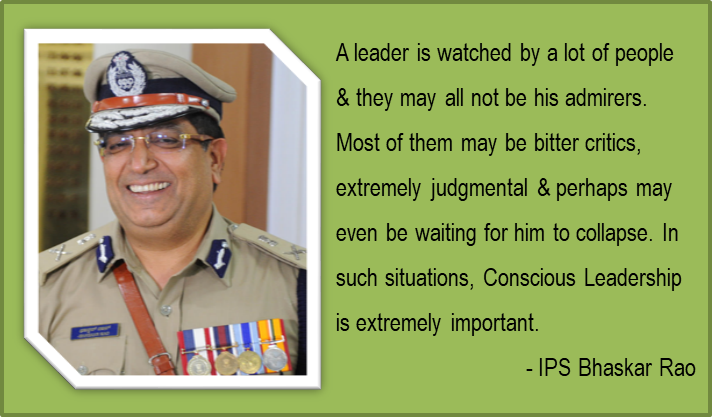IPS Bhaskar Rao, Former Commissioner of Police, Bengaluru and present Additional Director General of Police (ADGP) Railways shares insights with Sameera Fernandes on the importance of Conscious Leadership in today’s day and age.
How do we grow in self-awareness and take responsibility as a creator of our own experiences? What makes a conscious leader?
Unprecedented situations call for unprecedented reactions. We are all leaders if you go by a definition of those who want to lead change. A leader becomes radically responsible, self-aware and focusses on a culture of ‘we’ rather than a culture of ‘me’. Normally, a leader is watched by a lot of people. All those who are watching may not his admirers. Most of them are his bitter critics, extremely judgemental and perhaps may be even waiting for him to collapse. In such situations, Conscious Leadership is extremely important.
What according to you is one of the most important areas that one should keep in mind during the transformational journey?
Last year when I was the Commissioner of Police my learning curve was extremely steep. The only reaction I knew then, was to think a thousand times before reacting as everyone around is watching. Especially when you are in a responsible position, there can be various repercussions and hence it is important to take time and think more. I have learnt the first aspect of leadership is that I must be visible to all my people and listen before reacting. It is also important to trust the judgement of my subordinates though they may commit blunders. This is the time to stand by them and definitely not judgemental of their actions.
Being in a position of responsibility and power, how have you implemented this concept in your everyday life?
When one is in a position such as the Police Commissioner of Bengaluru, you are not just the boss. That’s the time when you have many visible and invisible bosses too. The concept of Conscious Leadership came to my rescue because despite having many bosses around, you finally are held responsible for what goes wrong and you are micro-judged and micro-evaluated throughout. This is where the power of collaboration makes all the difference. So when all the spotlights are on you and you don’t know how everyone is reacting, it is best to ensure that your entire team is in it together to drive forward positive change.
What makes a conscious leader different and effective? How have you led by example?
Communicating with over 21,000 constables across Bengaluru and sending out a strong message that they are the ‘Commissioner of Police’ created a mind-set of accountability and responsibility in all of us together. Empowering my team ensured that we could take immediate decisions all aligned to our bigger purpose. It is common knowledge that they are the front line. They are the ones behind the barricade. It is they who decide on how to address and solve people’s difficulties and grievances. Their action is important especially when one and a half crore people are directly under their protection and hence it was vital for me to take this stance and communicate accordingly.
Keeping in mind these turbulent times, how have you managed to sail through a culture of collaboration and team work?
Take for example a bundh in Bangalore – the logistics, the movement of people – we need to plan for the people who report to us. Conscious leadership is handling emotions of my own subordinates, controlling and managing my own thinking, managing the emotions of my peers who may be extremely judgemental, managing emotions of my bosses who are judged by their own bosses, media, social media and more. I learnt that it was very important to acknowledge mistakes when committed very graciously and boldly during this time as no one is expecting you to be perfect. Everyone is going through a similar situation during this challenging period so there is a deeper level of understanding and gratitude that prevails.
How do we ensure that an all-inclusive and pervasive culture is a way of life?
When times are good, it is the best time to engage in peace time interaction so that when crisis prevails, one will have the confidence in reaching out and seeking support when needed. I firmly believe, an inclusive administration ensures a spirit of collaboration and together spells success for all. It is important to maintain cordial relations when times are good. Leadership is all about empathy. Today’s world is all about shared leadership. If my subordinates feel that their boss should not know of a specific information for any reason, I trust their decision and leave it at that.
What are some of the books that have inspired your thought process?
The biography of Alexander the Great, Ghengis Khan and the Making of the Modern World by Jack Weatherford and the movie ‘Invictus’ on how Nelson Mandela used rugby to unite South Africa have inspired me.
The views and opinions published here belong to the interviewer and the interviewee and do not necessarily reflect the views and opinions of the publisher.



Be the first to comment on "Straight Talk with Bhaskar Rao"